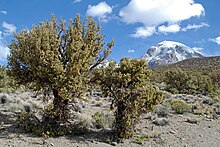| Polylepis rugulosa | |
|---|---|

| |
| Queñua trees on the slopes of Sajama volcano in the Bolivian Altiplano | |
| Scientific classification | |
| Kingdom: | Plantae |
| Clade: | Tracheophytes |
| Clade: | Angiosperms |
| Clade: | Eudicots |
| Clade: | Rosids |
| Order: | Rosales |
| Family: | Rosaceae |
| Genus: | Polylepis |
| Species: | P. rugulosa
|
| Binomial name | |
| Polylepis rugulosa Bitter
| |
Polylepis rugulosa, the queñua, is a species of plant in the family Rosaceae. It is primarily found in the Andes region of South America in Argentina, Bolivia, Chile and Peru. It is currently threatened by habitat loss.
This is a small tree, which is unable to grow more than 4 metres in height. It features a reddish-brown bark with brilliant compound leaves. The tree's fruit and flowers are generally unnoticeable since they are shrouded by the tree's foliage.
In the Andes of the Department of Tacna, Peru, the queñua tend to grow more on western slopes than on eastern ones.[2]
The tree has traditionally been used for firewood and coal-making.[2]
- ^ World Conservation Monitoring Centre (1998). "Polylepis rugulosa". IUCN Red List of Threatened Species. 1998: e.T37152A10037017. doi:10.2305/IUCN.UK.1998.RLTS.T37152A10037017.en. Retrieved 15 November 2021.
- ^ a b Gutierrez Flores, Ivon; Sanga Franco, Marianela; Ticona Quispe, Pedro (2023). "Características estructurales y preferencias topográficas de rodales de Polylepis rugulosa según la exposición de las laderas en la región más árida del suroeste de los Andes peruanos" [Structural characteristics and topographic preferences of Polylepis rugulosa stands according to slope exposure in the most arid region of the southwestern Peruvian Andes]. Bosque (in Spanish). 44 (2). doi:10.4067/s0717-92002023000200363.
